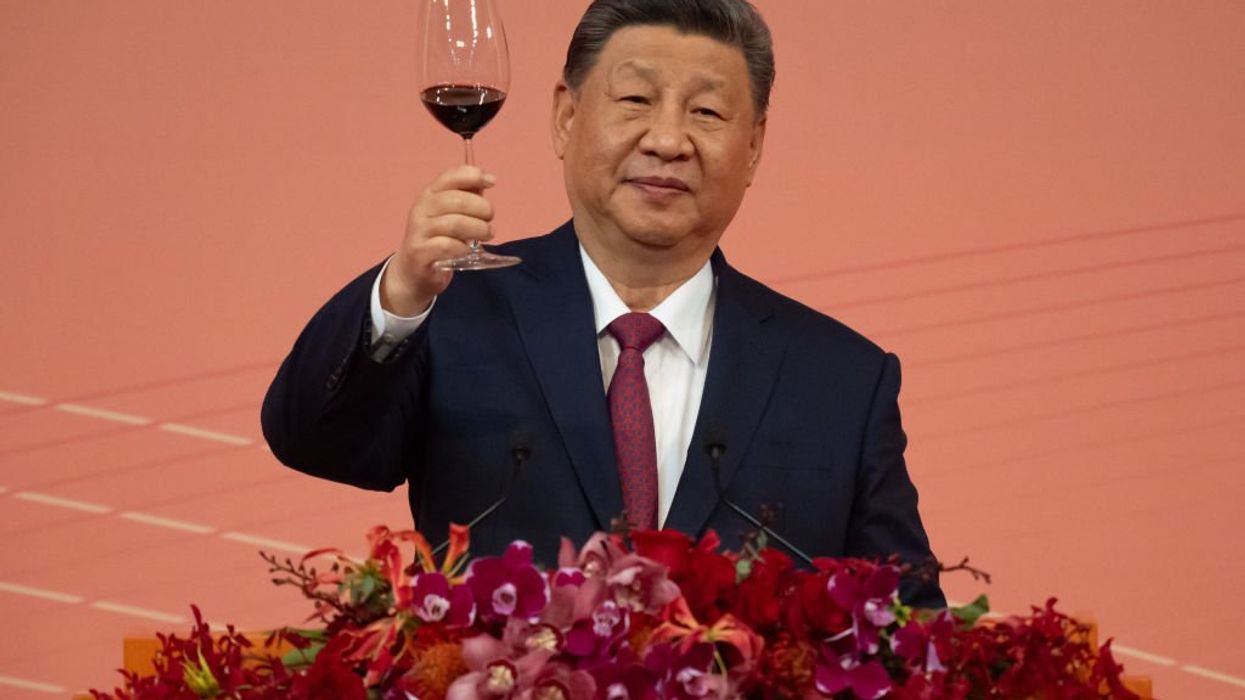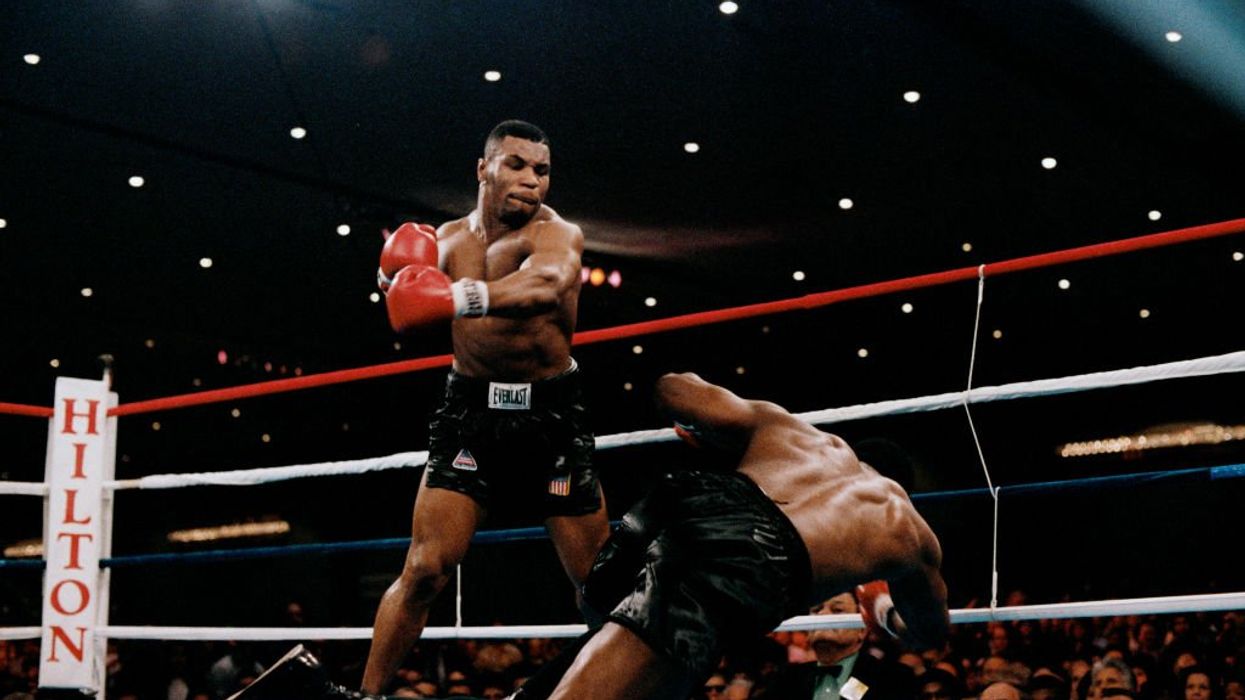BAGHDAD (AP) -- The leader of the extremist group that seized much of northern Iraq and Syria called on Muslims worldwide on Tuesday to join the battle and help build an Islamic state in the newly conquered territory.
The 19-minute audiotape from Abu Bakr al-Baghdadi came two days after his organization, the Islamic State of Iraq and the Levant, unilaterally declared the establishment of an Islamic state, or caliphate, in the land it controls. It also proclaimed al-Baghdadi the caliph, and demanded that all Muslims around the world pledge allegiance to him.
In the statement, al-Baghdadi makes clear his global ambition and presented himself as the leader of all Muslims. With his group's dramatic blitz in the heart of the Middle East, the Iraqi-born al-Baghdadi has made a bid to eclipse even al-Qaida chief Ayman al-Zawahri as the jihadi movement's most influential figure.
 FILE - This undated photo posted by the U.S. State Department in their Rewards for Justice website on June 18, 2014 shows Abu Bakr al-Baghdadi, leader of the Islamic State of Iraq and the Levant (ISIL). The leader of the extremist group that has swept over much of northern Syria and Iraq called on Muslims Tuesday, July 1, 2014 to immigrate to the territory his group has seized to help build an Islamic state. The 19-minute audiotape from Abu Bakr al-Baghdadi comes two days after his organization, the Islamic State of Iraq and the Levant, unilaterally declared the establishment of an Islamic state, or caliphate, in the land it controls. It also proclaimed al-Baghdadi the caliph, and demanded that all Muslims around the world pledge allegiance to him.(AP Photo/U.S. State Department Rewards for Justice, File)
FILE - This undated photo posted by the U.S. State Department in their Rewards for Justice website on June 18, 2014 shows Abu Bakr al-Baghdadi, leader of the Islamic State of Iraq and the Levant (ISIL). The leader of the extremist group that has swept over much of northern Syria and Iraq called on Muslims Tuesday, July 1, 2014 to immigrate to the territory his group has seized to help build an Islamic state. The 19-minute audiotape from Abu Bakr al-Baghdadi comes two days after his organization, the Islamic State of Iraq and the Levant, unilaterally declared the establishment of an Islamic state, or caliphate, in the land it controls. It also proclaimed al-Baghdadi the caliph, and demanded that all Muslims around the world pledge allegiance to him.(AP Photo/U.S. State Department Rewards for Justice, File)
He said the Islamic state is a land for all Muslims regardless of nationality, telling them it "will return your dignity, might, rights, and leadership."
"It is a state where the Arab and non-Arab, the white man and black man, the easterner and westerner are all brothers," he said - an appeal aimed at broadening his support base beyond the Middle East. "Muslims, rush to your state. Yes, it is your state. Rush, because Syria is not for the Syrians, and Iraq is not for the Iraqis. The earth is Allah's."
To help build that state, he appealed to those with practical skills - scholars, judges, doctors, engineers and people with military and administrative expertise - to come "answer the dire need of the Muslims for them."
He also called on jihadi fighters to escalate fighting in the holy month of Ramadan, which began on Sunday. "In this virtuous month or in any other month, there is no deed better than jihad in the path of Allah, so take advantage of this opportunity and walk the path of your righteous predecessors," he said. "So to arms, to arms, soldiers of the Islamic state, fight, fight."
Al-Baghdadi also urged Muslims worldwide to "Stand up and rise. For the time has come for you to free yourself from the shackles of weakness, and stand in the face of tyranny."
The audio was posted on militant websites where the group has issued statements in the past, and the voice resembled that on other audiotapes said to be by the shadowy al-Baghdadi, an Iraqi militant who has rarely been photographed or appeared in public.
Al-Baghdadi's group has already been a magnet for jihadi fighters from across the Arab world, the Caucasus and extremists from Europe and some from the United States - drawn by an organization that in a few short years has transformed from just an al-Qaida affiliate in Iraq into a transnational military force that has conquered and held a massive chunk of territory. Al-Qaida's al-Zawahri ejected al-Baghdadi from the terror network earlier this year.
Over the past year alone, al-Baghdadi's group - which has changed its name to simply the Islamic State, dropping the reference to Iraq and the Levant - has managed to effectively erase the Syria-Iraq border and lay the foundations of its proto-state. In June, Iraq saw its deadliest month in years, with more than 2,400 people killed, a reflection of the havoc wreaked as the group's fighters captured the country's second largest city in the north, Mosul, then swept south seizing most Sunni-dominated areas of northern and western Iraq and pushing close to Baghdad.
The Sunni insurgents' advance in Iraq appears to have crested, at least for now, as it reaches Shiite-majority areas, where resistance is tougher, and as it seeks to consolidate its control of the territory already in hand.
But in neighboring Syria, the group has continued to advance. On Tuesday, it captured the town of Boukamal near the Iraqi border. Its fighters advanced toward the town of Shuheil, just to the northwest, a stronghold of a rival extremist group, the Nusra Front. As fighting between rival groups intensified later Tuesday, thousands of Shuheil's inhabitants were seen fleeing the town, the Syrian Observatory for Human Rights said.
The Islamic State group also held a triumphant parade Monday evening in Raqqa, the largest city it controls in Syria. Fighters drove through the city displaying material apparently captured in neighboring Iraq - U.S.-made Humvees, heavy machineguns, tanks and armored personnel carriers and a flatbed truck carrying what appeared to be a Scud missile.
Videos posted online by activists showed the militants carrying automatic rifles and black flags, sitting atop vehicles and driving through Raqqa, honking amid occasional bursts of gunfire. The videos appeared genuine and matched Associated Press reporting of the event.
After melting away in the initial onslaught, Iraq's military and security forces have regrouped and managed to stem the tide at the outskirts of Shiite-dominated regions.
The country's political leaders, however, remain deeply divided.
On Tuesday, Iraq's new parliament deadlocked less than two hours into its first session when minority Sunnis and Kurds walked out, dashing hopes for the quick formation of a new government that could hold the country together in the face of the militant blitz.
Iraqi politicians are under pressure to quickly form a more inclusive government that can bring backing from the Sunni Muslim minority, which holds deep grievances with Shiite Prime Minister Nouri al-Maliki. Al-Maliki, who has held the post since 2006, is being pressed to step aside, with even most of his former allies blaming his failure to promote reconciliation for stoking Sunni support for the insurgency.
Acting speaker Mahdi al-Hafidh ended the proceedings after most of the 328-member legislature's Sunni and Kurdish lawmakers did not return following a short break, depriving parliament of a quorum.
The impasse prolongs what has already been days of intense jockeying as political blocs try to decide on a prime minister, president and speaker of parliament.
The main sticking point is the job of prime minister, which holds the main levers of power. Under an informal system that took hold after the 2003 U.S.-led invasion, Iraq's prime minister is chosen from the Shiite Muslim community, the president from the ethnic Kurdish minority and the speaker of parliament from the minority Sunni Muslim community.
Al-Maliki has shown no willingness publicly to bow out. His bloc won the most votes in April elections, which traditionally would give him first crack at forming a new government.
Sunni lawmaker Hamid al-Mutlaq said the Sunnis walked out of Tuesday's parliament session because they feel they need more time to reach an understanding to "change the course that has led the country to the current disaster."
"We do not want only to discuss the distribution of posts and the names of the candidates," he told the AP. "Rather, we think we need to discuss how to change the behavior of the failing government."

 FILE - This undated photo posted by the U.S. State Department in their Rewards for Justice website on June 18, 2014 shows Abu Bakr al-Baghdadi, leader of the Islamic State of Iraq and the Levant (ISIL). The leader of the extremist group that has swept over much of northern Syria and Iraq called on Muslims Tuesday, July 1, 2014 to immigrate to the territory his group has seized to help build an Islamic state. The 19-minute audiotape from Abu Bakr al-Baghdadi comes two days after his organization, the Islamic State of Iraq and the Levant, unilaterally declared the establishment of an Islamic state, or caliphate, in the land it controls. It also proclaimed al-Baghdadi the caliph, and demanded that all Muslims around the world pledge allegiance to him.(AP Photo/U.S. State Department Rewards for Justice, File)
FILE - This undated photo posted by the U.S. State Department in their Rewards for Justice website on June 18, 2014 shows Abu Bakr al-Baghdadi, leader of the Islamic State of Iraq and the Levant (ISIL). The leader of the extremist group that has swept over much of northern Syria and Iraq called on Muslims Tuesday, July 1, 2014 to immigrate to the territory his group has seized to help build an Islamic state. The 19-minute audiotape from Abu Bakr al-Baghdadi comes two days after his organization, the Islamic State of Iraq and the Levant, unilaterally declared the establishment of an Islamic state, or caliphate, in the land it controls. It also proclaimed al-Baghdadi the caliph, and demanded that all Muslims around the world pledge allegiance to him.(AP Photo/U.S. State Department Rewards for Justice, File)


